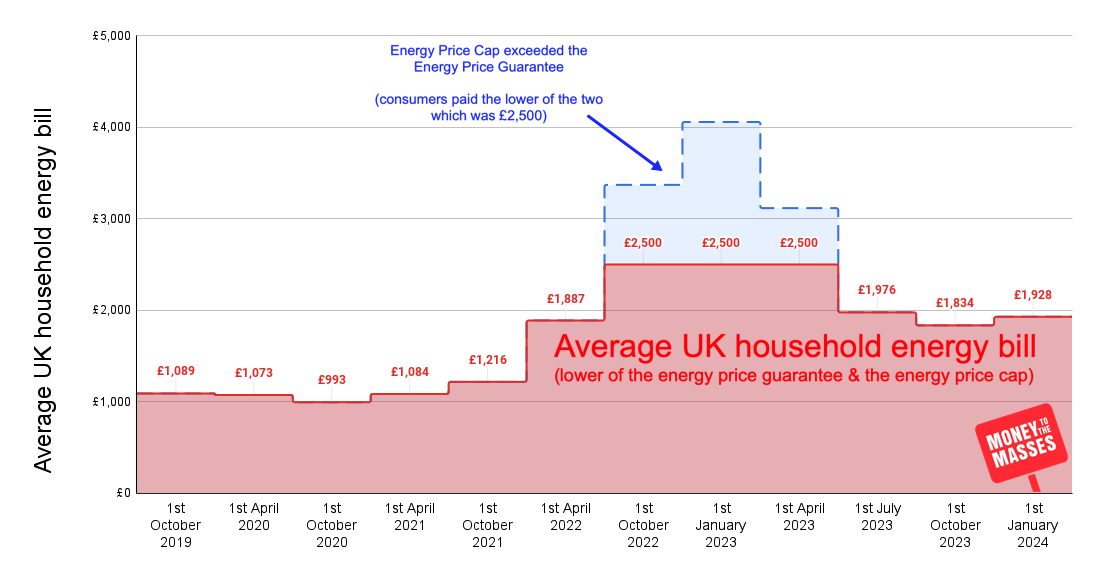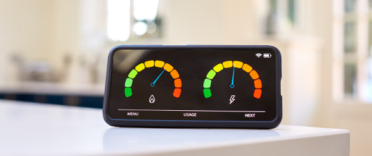Ofgem, the UK's energy regulatory body, has announced that from the 1st January 2024, the energy price cap will increase by 5% from its current level of £1,834 to £1,928. This equates to an additional £94 on the typical annual household dual-fuel energy bill assuming they are on their supplier's standard tariff and paying via Direct Debit. This rise in the energy price cap is in response to the rising costs in the wholesale energy market.
Those customers who do not pay via direct debit will still see prices rise by 5% to £2,058 a year for an average household in January 2024. Customers who are on prepayment meters will see annual energy bills rise from £1,949 to £1,960. While this is higher than for those customers not on prepayment meters, the government's Energy Price Guarantee is being used to cover this difference until April 2024. Ofgem is also looking at plans to bring prepayment and direct debit customer charges into line after this date.
Unfortunately, the rise in the energy price cap following the removal of the government's energy bill support scheme means that energy bills will only be marginally lower than they were last winter for most UK consumers, which we explain in detail later in this article.
What is the energy price cap?
The energy price cap was introduced by Ofgem to control the maximum amount that energy providers are allowed to charge consumers for each unit of gas and electricity. Ofgem calculates the price cap every 3 months and takes into account the cost of VAT, wholesale energy prices and the cost to provide energy. It then provides an annual figure based on the average dual-fuel household that pays via direct debit.
The energy price cap is based on the average dual-fuel household bill and how much you will actually pay will vary depending on how much energy you use.
'Typical usage' - what does this mean?
Ofgem defines what it considers to be '"typical usage", which it reviews periodically in light of consumers' changing usage of gas and electricity. It then uses this to provide the annual energy price cap figure. In October 2023, Ofgem reviewed and altered its "typical usage" for an average UK household to 11,500 kWh of gas and 2,700 kWh of electricity a year.
Of course, this does make comparisons between previous energy price caps and the current one tricky. So to overcome this the table below shows historic energy price caps based upon the current Ofgem definition of "typical usage".
| Date Energy Price cap is effective from | Energy Price Cap |
| 1st October 2019 | £1,089 |
| 1st April 2020 | £1,073 |
| 1st October 2020 | £993 |
| 1st April 2021 | £1,084 |
| 1st October 2021 | £1,216 |
| 1st April 2022 | £1,887 |
| 1st October 2022 | £3,371 |
| 1st January 2023 | £4,059 |
| 1st April 2023 | £3,116 |
| 1st July 2023 | £1,976 |
| 1st October 2023 | £1,834 |
| 1st January 2024 | £1,928 |
How much will I pay for energy under the new price cap?
The following table shows how much you can expect to pay for each unit of gas and electricity from 1st January 2024. Figures are rounded to the nearest pence and will vary depending on where you live in the UK. Remember, the amount you pay under the new price cap will be based upon your energy usage and the charges stated below, assuming you pay by Direct Debit.
| Current energy price per unit
(1st October - 31st December 2023) |
New energy price per unit
(1st January - 31st March 2024) |
|
| Electricity | Daily Standing charge: 53.37p
Unit price per kWh: 27.35p |
Daily Standing charge: 53.35p
Unit price per kWh: 28.62p |
| Gas | Daily Standing charge: 29.62p
Unit price per kWh: 6.89p |
Daily Standing charge: 29.60p
Unit price per kWh: 7.42p |
(Source: Ofgem)
Will energy bills be lower than last winter?
The increase in the energy price cap means that the average UK household will pay £1,928 a year based on typical usage assuming that they are on their energy provider's standard tariff and paying by direct debit. Of course, the actual amount you will pay will depend on your actual energy usage as well as where you live, how you pay and what type of meter you have.
While the energy price cap will rise from its current level of £1,834 to £1,928, this is still below the levels seen last winter. Last winter the government's Energy Price Guarantee ensured that consumers' bills, based on typical usage, did not exceed £2,500, even when Ofgem's energy price cap exceeded £4,000, as shown in the chart below (click on it to enlarge). However, energy bills were further reduced last winter, thanks to the government's £400 energy bill support scheme.
When you factor in the loss of the £400 energy bill support scheme it means that the typical UK household's energy bill this winter will be just 8.2% lower than last winter.
However, that saving will vary depending on your energy usage and some consumers may find their energy bills are higher than they were last year.
It is also worth pointing out that the energy price cap in January 2024 will be 58% higher than it was prior to the start of the war in Ukraine.
What to do if you're struggling to afford your energy bills
If the cost of energy is becoming overwhelming your energy supplier may be able to help you arrange an affordable repayment plan so it is best to contact them as soon as possible. We provide some tips if you are struggling to afford your energy bills in our article 'How to save money on your energy bills'.
There are also a number of grants and schemes available for those who are most vulnerable. More information and help on the cost of living can be found in our Cost of Living guide.







